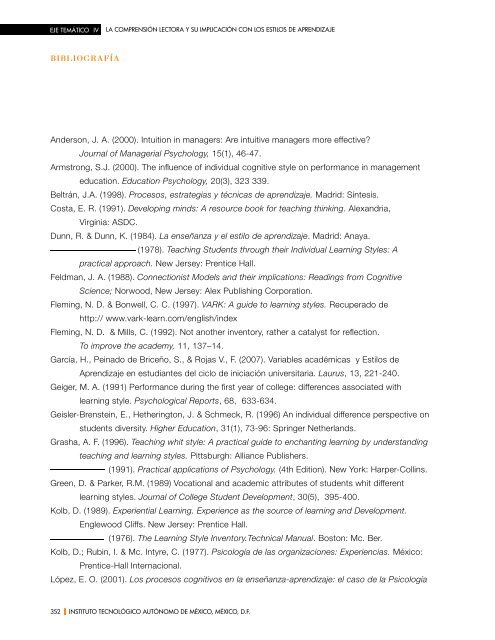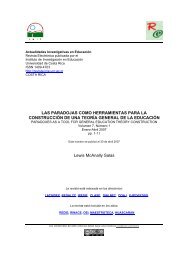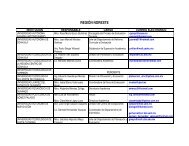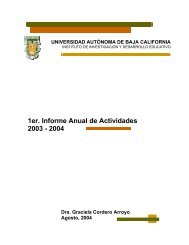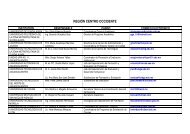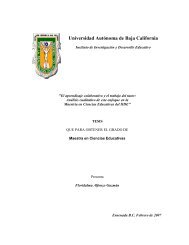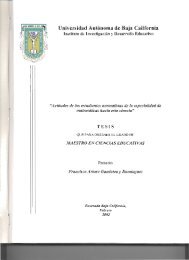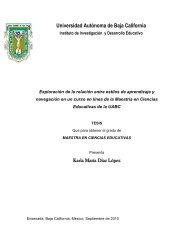- Page 1:
MEMORIA DE PONENCIAS III SEMINARIO
- Page 4 and 5:
Primera edición, 2012 MEMORIA DEL
- Page 6:
Red Cultura Escrita y Comunidades D
- Page 9 and 10:
524. Tres estrategias de intervenci
- Page 11 and 12:
560. Fortalecimiento de las habilid
- Page 13 and 14:
513. La voz del autor y el texto en
- Page 15 and 16:
573. Pensamiento crítico y literac
- Page 17:
206. Jóvenes, potenciales mediador
- Page 20:
convocatoria y en el programa acad
- Page 23 and 24:
509. RelaCIONes eNTRe CONOCIMIeNTO
- Page 25 and 26:
VEGA LÓPEz, BAñALES FAz que el le
- Page 27 and 28:
VEGA LÓPEz, BAñALES FAz previo ti
- Page 29 and 30:
conocimiento previo del tema Nivel
- Page 31 and 32:
Perfetti, C. A., rouet, j.f. & Brit
- Page 33 and 34:
503. esTRaTeGIas De esCRITURa CReaT
- Page 35 and 36:
VAqUERO MARTíNEz Ante esta realida
- Page 37 and 38:
VAqUERO MARTíNEz ubico al escritor
- Page 41 and 42:
507. De esTUDIaNTe a INVesTIGaDOR:
- Page 43 and 44:
una condición crucial para el apre
- Page 45 and 46:
CONCLuSIONES En una comunidad de pr
- Page 49 and 50:
512. la esCRITURa De la TesIs DOCTO
- Page 51 and 52:
PAChECO MÉNDEz los procesos de for
- Page 53 and 54:
PAChECO MÉNDEz unívoca. “Hay ca
- Page 55:
IbLIOgRAfÍA Dogan, M. & Phare, r.
- Page 58 and 59:
EJE TEMÁTICO II EL DESARROLLO DE h
- Page 60 and 61:
EJE TEMÁTICO II EL DESARROLLO DE h
- Page 62 and 63:
EJE TEMÁTICO II EL DESARROLLO DE h
- Page 64:
EJE TEMÁTICO II EL DESARROLLO DE h
- Page 68 and 69:
EJE TEMÁTICO II MODELOS PEDAGÓGIC
- Page 70 and 71:
EJE TEMÁTICO II MODELOS PEDAGÓGIC
- Page 72 and 73:
EJE TEMÁTICO II MODELOS PEDAGÓGIC
- Page 74 and 75:
EJE TEMÁTICO II MODELOS PEDAGÓGIC
- Page 77 and 78:
524. TRes esTRaTeGIas De INTeRVeNCI
- Page 79 and 80:
FLORES TREVIñO, GONzÁLEz SALINAS,
- Page 81 and 82:
FLORES TREVIñO, GONzÁLEz SALINAS,
- Page 83 and 84:
1. fOrMACIÓN Diplomado en redacci
- Page 85:
FLORES TREVIñO, GONzÁLEz SALINAS,
- Page 88 and 89:
EJE TEMÁTICO II PLANTEAMIENTO Y RE
- Page 90 and 91:
EJE TEMÁTICO II PLANTEAMIENTO Y RE
- Page 92 and 93:
EJE TEMÁTICO II PLANTEAMIENTO Y RE
- Page 94:
EJE TEMÁTICO II PLANTEAMIENTO Y RE
- Page 98 and 99:
EJE TEMÁTICO II EVOLUCIÓN DEL CEN
- Page 100 and 101:
EJE TEMÁTICO II EVOLUCIÓN DEL CEN
- Page 102 and 103:
EJE TEMÁTICO II EVOLUCIÓN DEL CEN
- Page 104 and 105:
EJE TEMÁTICO II EVOLUCIÓN DEL CEN
- Page 106:
EJE TEMÁTICO II EVOLUCIÓN DEL CEN
- Page 110 and 111:
EJE TEMÁTICO II LA PRODUCCIÓN ESC
- Page 112 and 113:
EJE TEMÁTICO II LA PRODUCCIÓN ESC
- Page 114 and 115:
EJE TEMÁTICO II LA PRODUCCIÓN ESC
- Page 117 and 118:
534. esCRITURa pOR pROCesO: la plaN
- Page 119 and 120:
hUERTA RODRíGUEz piamente de la pl
- Page 121 and 122:
hUERTA RODRíGUEz 3. LLuvIAS DE IDE
- Page 123 and 124:
Ilustración 1. Ilustración 2. hUE
- Page 125 and 126:
Ilustración 5. Ilustración 6. hUE
- Page 127 and 128:
Ilustración 9. hUERTA RODRíGUEz 1
- Page 129:
hUERTA RODRíGUEz 1 AL 3 DE AGOSTO
- Page 132 and 133:
EJE TEMÁTICO II EL USO DE ORGANIzA
- Page 134 and 135:
EJE TEMÁTICO II EL USO DE ORGANIzA
- Page 136 and 137:
EJE TEMÁTICO II EL USO DE ORGANIzA
- Page 138 and 139:
EJE TEMÁTICO II EL USO DE ORGANIzA
- Page 141 and 142:
539. eNseñaNza UNIVeRsITaRIa De lI
- Page 143 and 144:
1 AL 3 DE AGOSTO DE 2012 VILLEGAS S
- Page 145 and 146:
1 AL 3 DE AGOSTO DE 2012 VILLEGAS S
- Page 147 and 148:
1 AL 3 DE AGOSTO DE 2012 VILLEGAS S
- Page 149:
IbLIOgRAfÍA Eco, U. (2009). El lec
- Page 152 and 153:
EJE TEMÁTICO II EL CONCEPTO DE “
- Page 154 and 155:
EJE TEMÁTICO II EL CONCEPTO DE “
- Page 156 and 157:
EJE TEMÁTICO II EL CONCEPTO DE “
- Page 159 and 160:
545. DesVIaCIONes lINGüísTICO-TeX
- Page 161 and 162:
MOSCOL MOGOLLÓN presente en todo e
- Page 163 and 164:
MOSCOL MOGOLLÓN 6. Citación Tambi
- Page 165 and 166:
CONCLuSIONES Se presentaron con má
- Page 169 and 170:
546. UN FORO paRa la pRÁCTICa De l
- Page 171 and 172:
tica sus maniobras conversacionales
- Page 173 and 174:
fASE 4. ENTREgA DEL ENSAyO fINAL A
- Page 177 and 178:
548. DesaRROllO De la HaBIlIDaD De
- Page 179 and 180:
PÉREz AGUIRRE, RAMOS GARzA, MARTí
- Page 181 and 182:
acciones productivas donde los miem
- Page 183:
Psychology Review. PÉREz AGUIRRE,
- Page 186 and 187:
EJE TEMÁTICO II APRENDER A PENSAR
- Page 188 and 189:
EJE TEMÁTICO II APRENDER A PENSAR
- Page 190:
EJE TEMÁTICO II APRENDER A PENSAR
- Page 194 and 195:
EJE TEMÁTICO II ENSEñANDO A LEER
- Page 196 and 197:
EJE TEMÁTICO II ENSEñANDO A LEER
- Page 198 and 199:
EJE TEMÁTICO II ENSEñANDO A LEER
- Page 200:
EJE TEMÁTICO II ENSEñANDO A LEER
- Page 204 and 205:
EJE TEMÁTICO II La Lista Y JournaL
- Page 206 and 207:
EJE TEMÁTICO II La Lista Y JournaL
- Page 208 and 209:
EJE TEMÁTICO II La Lista Y JournaL
- Page 211 and 212:
558. la eNseñaNza De la esCRITURa
- Page 213 and 214:
hERNÁNDEz RAMíREz Ahora bien, los
- Page 215 and 216:
investigación (se observa, se oper
- Page 219 and 220:
559. RelaCIÓN De la leCTURa Y la e
- Page 221 and 222:
MARCO TEÓRICO Si pensamiento y len
- Page 223 and 224:
1 AL 3 DE AGOSTO DE 2012 GORDILLO P
- Page 225:
IbLIOgRAfÍA Anguera, M. T. (1986).
- Page 228 and 229:
EJE TEMÁTICO II FORTALECIMIENTO DE
- Page 230 and 231:
EJE TEMÁTICO II FORTALECIMIENTO DE
- Page 232 and 233:
EJE TEMÁTICO II FORTALECIMIENTO DE
- Page 235 and 236:
562. el CONOCIMIeNTO ReTÓRICO De l
- Page 237 and 238:
PERALES ESCUDERO sociales; como res
- Page 239 and 240:
PERALES ESCUDERO Se preguntó a los
- Page 241 and 242:
IbLIOgRAfÍA PERALES ESCUDERO Barbe
- Page 245 and 246:
567. ValORaCIÓN De las FICHas De T
- Page 247 and 248:
1 AL 3 DE AGOSTO DE 2012 DíAz RIVE
- Page 249 and 250:
Alumno Aspectos negativos Aspectos
- Page 251:
IbLIOgRAfÍA Argudín, y. & Luna, M
- Page 254 and 255:
EJE TEMÁTICO II PROCESO DE ESCRITU
- Page 256 and 257:
EJE TEMÁTICO II PROCESO DE ESCRITU
- Page 258 and 259:
EJE TEMÁTICO II PROCESO DE ESCRITU
- Page 261 and 262:
572. el TRaBaJO eN eqUIpO Y la lITe
- Page 263 and 264:
GUERRERO MOLINA, LÓPEz BONILLA RES
- Page 265 and 266:
GUERRERO MOLINA, LÓPEz BONILLA Com
- Page 267:
IbLIOgRAfÍA GUERRERO MOLINA, LÓPE
- Page 270 and 271:
EJE TEMÁTICO II LA ARGUMENTACIÓN
- Page 272 and 273:
EJE TEMÁTICO II LA ARGUMENTACIÓN
- Page 274 and 275:
EJE TEMÁTICO II LA ARGUMENTACIÓN
- Page 276 and 277:
EJE TEMÁTICO III DesDe lOs ReCURsO
- Page 278 and 279:
EJE TEMÁTICO III LA ESCRITURA COLA
- Page 280 and 281:
EJE TEMÁTICO III LA ESCRITURA COLA
- Page 282 and 283:
EJE TEMÁTICO III LA ESCRITURA COLA
- Page 285 and 286:
557. ReCURsOs DIGITales 2.0 paRa la
- Page 287 and 288:
1 AL 3 DE AGOSTO DE 2012 REYES ANGO
- Page 289 and 290:
tocorregibles, wikis, blogs, etcét
- Page 291 and 292:
Figura 2. Dimensiones del lenguaje
- Page 293:
ichardson, W (2009). Blogs, wikis,
- Page 296 and 297:
EJE TEMÁTICO III AULAS VIRTUALES D
- Page 298 and 299:
EJE TEMÁTICO III AULAS VIRTUALES D
- Page 300:
EJE TEMÁTICO III bIbLIOgRAfÍA AUL
- Page 303 and 304: 504. la aCCIÓN TUTORIal paRa FOMeN
- Page 305 and 306: RUIz DE LA TORRE En este contexto d
- Page 307 and 308: RUIz DE LA TORRE > Promover la part
- Page 309 and 310: Tabla 1. DIRECCIÓN O INSTANCIA QUE
- Page 311: IbLIOgRAfÍA RUIz DE LA TORRE ANUIE
- Page 314 and 315: EJE TEMÁTICO IV TRAYECTORIAS FORMA
- Page 316 and 317: EJE TEMÁTICO IV TRAYECTORIAS FORMA
- Page 318 and 319: EJE TEMÁTICO IV TRAYECTORIAS FORMA
- Page 321 and 322: 511. pRÁCTICas leTRaDas eN la CaRR
- Page 323 and 324: FLORES MACíAS, MORALES RUIz, OTERO
- Page 325 and 326: del PLEP validan el contenido de la
- Page 327: IbLIOgRAfÍA FLORES MACíAS, MORALE
- Page 330 and 331: EJE TEMÁTICO IV LA VOz DEL AUTOR Y
- Page 332 and 333: EJE TEMÁTICO IV LA VOz DEL AUTOR Y
- Page 334 and 335: EJE TEMÁTICO IV LA VOz DEL AUTOR Y
- Page 337 and 338: 515. INsTITUCIONalIzaCIÓN De la pR
- Page 339 and 340: MÉNDEz OChAITA chos resultados, lo
- Page 341 and 342: MÉNDEz OChAITA LA PubLICACIÓN COM
- Page 343: IbLIOgRAfÍA MÉNDEz OChAITA Bazerm
- Page 346 and 347: EJE TEMÁTICO IV LA COMPRENSIÓN LE
- Page 348 and 349: EJE TEMÁTICO IV LA COMPRENSIÓN LE
- Page 350 and 351: EJE TEMÁTICO IV LA COMPRENSIÓN LE
- Page 355 and 356: 520. pOTeNCIaCIÓN De HaBIlIDaDes l
- Page 357 and 358: AqUINO LÓPEz, OROzCO LÓPEz, ALMEI
- Page 359 and 360: AqUINO LÓPEz, OROzCO LÓPEz, ALMEI
- Page 361 and 362: IbLIOgRAfÍA AqUINO LÓPEz, OROzCO
- Page 365 and 366: 525. CReeNCIas De la COMpReNsIÓN l
- Page 367 and 368: hERNÁNDEz ROJAS, RODRíGUEz VARELA
- Page 369 and 370: hERNÁNDEz ROJAS, RODRíGUEz VARELA
- Page 371 and 372: hERNÁNDEz ROJAS, RODRíGUEz VARELA
- Page 373 and 374: Gráfica 10. Necesidad de aprendiza
- Page 377 and 378: 529. pRÁCTICas leTRaDas eN DOs sIs
- Page 379 and 380: ARIAS, CANTAMUTTO, NEGRIN LONG frec
- Page 381 and 382: ARIAS, CANTAMUTTO, NEGRIN LONG trab
- Page 383: IbLIOgRAfÍA ARIAS, CANTAMUTTO, NEG
- Page 386 and 387: EJE TEMÁTICO IV RESPUESTAS LECTORA
- Page 388 and 389: EJE TEMÁTICO IV RESPUESTAS LECTORA
- Page 390 and 391: EJE TEMÁTICO IV RESPUESTAS LECTORA
- Page 392: EJE TEMÁTICO IV RESPUESTAS LECTORA
- Page 396 and 397: EJE TEMÁTICO IV VALORACIÓN DE UN
- Page 398 and 399: EJE TEMÁTICO IV VALORACIÓN DE UN
- Page 400: EJE TEMÁTICO IV VALORACIÓN DE UN
- Page 404 and 405:
EJE TEMÁTICO IV LAS DIEz TESIS PAR
- Page 406 and 407:
EJE TEMÁTICO IV LAS DIEz TESIS PAR
- Page 408 and 409:
EJE TEMÁTICO IV LAS DIEz TESIS PAR
- Page 411 and 412:
543. leeR eN el BaCHIlleRaTO. UNa e
- Page 413 and 414:
SÁNChEz PORRAS Desde esta perspect
- Page 415:
IbLIOgRAfÍA SÁNChEz PORRAS Álvar
- Page 418 and 419:
EJE TEMÁTICO IV METÁFORAS DE LA L
- Page 420 and 421:
EJE TEMÁTICO IV METÁFORAS DE LA L
- Page 422:
EJE TEMÁTICO IV METÁFORAS DE LA L
- Page 426 and 427:
EJE TEMÁTICO IV APRENDER A ESCRIBI
- Page 428 and 429:
EJE TEMÁTICO IV APRENDER A ESCRIBI
- Page 430 and 431:
EJE TEMÁTICO IV APRENDER A ESCRIBI
- Page 432 and 433:
EJE TEMÁTICO IV APRENDER A ESCRIBI
- Page 435 and 436:
550. aGRUpaMIeNTO asOCIaTIVO De IDe
- Page 437 and 438:
¿Qué NECESIDADES DE LA fORMACIÓN
- Page 439 and 440:
Existen dos tipos de enfoque de inv
- Page 441:
IbLIOgRAfÍA Caldera, r. & Bermúde
- Page 444 and 445:
EJE TEMÁTICO IV LA ESCRITURA DE ES
- Page 446 and 447:
EJE TEMÁTICO IV LA ESCRITURA DE ES
- Page 448 and 449:
EJE TEMÁTICO IV LA ESCRITURA DE ES
- Page 451 and 452:
555. eDUCaCIÓN INTeRCUlTURal Y esT
- Page 453 and 454:
puntuación y ortografía. LEPE LIR
- Page 455:
IbLIOgRAfÍA LEPE LIRA, MÉNDEz PUG
- Page 458 and 459:
EJE TEMÁTICO IV LITERACIDAD DISCIP
- Page 460 and 461:
EJE TEMÁTICO IV LITERACIDAD DISCIP
- Page 462 and 463:
EJE TEMÁTICO IV LITERACIDAD DISCIP
- Page 464 and 465:
EJE TEMÁTICO IV LITERACIDAD DISCIP
- Page 467 and 468:
573. peNsaMIeNTO CRíTICO Y lITeRaC
- Page 469 and 470:
hERNÁNDEz zAMORA, GARCíA FRANCO,
- Page 471 and 472:
hERNÁNDEz zAMORA, GARCíA FRANCO,
- Page 473 and 474:
(visión normativa) y la forma en l
- Page 475:
hERNÁNDEz zAMORA, GARCíA FRANCO,
- Page 478 and 479:
EJE TEMÁTICO IV ESCRITURA E INCONS
- Page 480 and 481:
EJE TEMÁTICO IV ESCRITURA E INCONS
- Page 482 and 483:
EJE TEMÁTICO IV ESCRITURA E INCONS
- Page 485 and 486:
581. la eValUaCIÓN De eNsaYOs DeNT
- Page 487 and 488:
1 AL 3 DE AGOSTO DE 2012 LÓPEz PAL
- Page 489 and 490:
CONCLuSIONES 1) Al margen del desaf
- Page 491 and 492:
Tabla 4. Avance y dificultades de l
- Page 493 and 494:
Tabla 8. Nivel alcanzado en cada ra
- Page 495 and 496:
1 AL 3 DE AGOSTO DE 2012 LÓPEz PAL
- Page 497 and 498:
CARTEL 201 Proyecto cincuenta: guí
- Page 500 and 501:
CARTELES eJe TeMÁTICO III: DesDe l
- Page 502:
CARTEL 204 la lectura como un model
- Page 505 and 506:
CARTEL 205 el artículo de opinión
- Page 507 and 508:
CARTEL 207 EXPRESIÓN, COMUNICACIÓ
- Page 509:
CARTEL 209 EL IMPACTO DE LECTORES V
- Page 512:
RED CULTURA ESCRITA Y COMUNIDADES D


